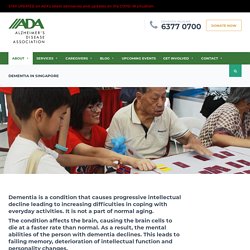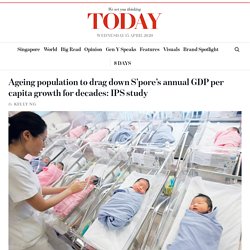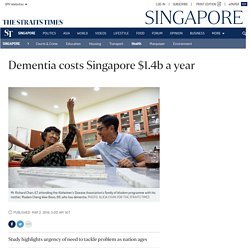

An ageing population comes with a unique set of challenges, from reduced economic growth to increased healthcare and social services costs especially with the increasing needs of the daycare centre and dementia care for older adults.
An ageing population comes with a unique set of challenges, from reduced economic growth to increased healthcare and social services costs.
Dementia in Singapore – Alzheimer's Disease Association. Dementia is a condition that causes progressive intellectual decline leading to increasing difficulties in coping with everyday activities.

It is not a part of normal aging. The condition affects the brain, causing the brain cells to die at a faster rate than normal. As a result, the mental abilities of the person with dementia declines. This leads to failing memory, deterioration of intellectual function and personality changes. In 2018, dementia has affected 50 million people worldwide, and this number is expected to rise to 82 million by 2030 and 152 million by 2050 (Source: From Plan to Impact (Alzheimer’s Disease International, 2017)). Locally, according to the Well-being of the Singapore Elderly (WiSE) study led by the Institute of Mental Health in 2015, one in 10 people aged 60 and above may have dementia. The financial strain is felt worldwide as dementia is expected to become a trillion-dollar health condition. Where To Go For Diagnosis. Singapore’s Ageing Population: The Financial Implications Of Our Country Growing Old. This article was written in partnership with the Ministry of Finance.

Views expressed are the independent opinion of DollarsAndSense.sg Similar to other developed societies, Singaporeans are living longer and the population is ageing. But it’s not just that. With slowing population growth, our workforce is maturing and shrinking at the same time. What do such trends mean to us, and what can be done about it? Definition Of An Ageing Population? An ageing population simply means the country’s population as a whole is getting older, with more elderly members and fewer younger people. What Happens When Our Population Grows Old? The challenges that arise from an ageing population may seem too abstract to affect us individually.
Less Working Adults To Support More Older People According to Population.sg, Singapore has about 4.7 citizens of working age (20 – 64) in 2016 for every 1 older adult (65 and above). Source: Population.sg Think about this from our own perspectives. . #1 Stay Healthy. Aging population of Singapore - Statistics & Facts. TODAYonline. SINGAPORE — If fertility rates in Singapore remain at current levels, the ageing population will cause a drag of 1.5 percentage points on per capita gross domestic product (GDP) growth every year until 2060.

Delivering the finding in a study on Thursday (Jan 18), researchers from the Institute of Policy Studies (IPS) estimated there will be 91 elderly citizens for every 100 working-age Singaporeans by 2080 — up 10-fold from 1980. This was based on the assumption that total fertility rate stagnates at 1.3, with 20,000 immigrants adding to the population each year, said IPS senior research fellow Christopher Gee in a 20-page paper titled Harnessing Singapore’s longevity dividends: The Generational Economy, Society and Polity. Dementia costs Singapore $1.4b a year, Health News. Dementia and its accompanying woes cost the country $1.4 billion every year, making it among the biggest drains on the healthcare system here.

This alarming figure, uncovered for the first time by local and international researchers, underscores the need to prevent the debilitating disease from taking hold in greying Singapore, say experts. "Part of trying to define the scale of the problem is finding out dementia's economic cost," said Professor Chong Siow Ann, vice-chairman of the Institute of Mental Health's medical board (research), who was involved in the study. "That then gives us an idea where we might want to intervene. " He and 13 others, from IMH, Changi General Hospital, the Ministry of Health and King's College London analysed the social care costs - such as care provided by family members and maids - and healthcare costs of 2,565 people, the majority of them aged 60 to 74.
About one in 10 of them had dementia - consistent with the national average.